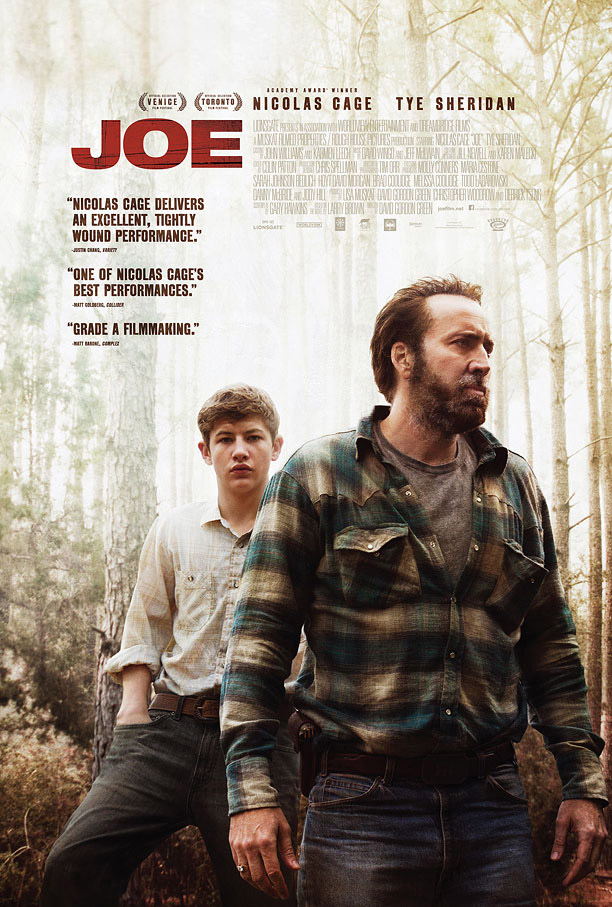 Joe
Directed by: David Gordon Green
Cast: Nicolas Cage, Tye Sheridan, Ronnie Gene Blevins, Gary Poulter
Running Time: 1 hr 58 mins
Rating: R
Release Date: April 11, 2014
Joe
Directed by: David Gordon Green
Cast: Nicolas Cage, Tye Sheridan, Ronnie Gene Blevins, Gary Poulter
Running Time: 1 hr 58 mins
Rating: R
Release Date: April 11, 2014
PLOT: An ex-con-turned-day-laborer-boss (Cage) takes a homeless boy (Sheridan) under his wing.
WHO'S IT FOR? Those ready for something completely different (and great) from Cage, and director David Gordon Green.
OVERALL
As the movie's spirit animal, Nicolas Cage keeps the primal film charged and unpredictable. This is a performance narrowed in on his potential, unhinged and huge all at once, but marking the return of taking his drama seriously. Unmistakably, he continues to be proud of the maniac he has always been, but plays this character with a grand sense of authority.
Cage appears opposite a group of supporting men who are vivid in their raw qualities. The young Tye Sheridan, after having expressed age in films from Terrence Malick and Jeff Nichols, presents a sturdy image of a young man trying to find an identity of maturity through hard work. On the different side of composure is Ronnie Gene Blevins' tumultuous Willie-Russell, who confronts the theme's defining characteristic of fear by wearing its mark on his face. His level of being a sociopath is equal to some throw away villains in action movies, but Blevins shows a true masculine fear in his worn face, even when he is screaming about his indifference to death.
These grounded performances in Joe are upstaged by one presentation whose acting is too raw to be categorized as a typical performance. Non-actor Gary Poulter provides an entirely ruthless force as Wade, the film's main villain, but also its most tragic figure of manhood. His usage in the film speaks to what potential non-actors provide when directors seek to express the non-fictional elements within their fictional story. With Poulter's actual background (look it up AFTER seeing the film), he is as flesh-and-blood as the non-cinematic environment in which this film takes place, his raspy voice and grizzled mug completely removed from the type of calculated showmanship that has become Hollywood acting. When he strikes Sheridan in the face with a heavy fist (like in the film's mesmerizing first shot) or stands up to Cage, Poulter provides a rare sensation of witnessing purity in a Hollywood film.
Carrying the soft interiors of Cage's title character, director Green frames the beauty of his locations with the help of his right-hand cinematographer, Tim Orr. The camera has a documentary's eye, breathing in the characters (actors and non-actors) within their environment, while then providing a starkness to its narrative parts. Green still has a mythic love for slow motion, as a scene with Poulter pop-and-lockin' is filmed with the same meditative quality as his running young non-actors in George Washington, or even the break-dance interlude in Pineapple Express.
With its definitive gritty disorder, Joe can be a messy film in itself, taking on Cage-like tangents for the sake of attitude more than narrative (a scene involving Cage looking for his dog, for example). Other storytellers would fear these offshoots, but Green robustly utilizes them to service his grand interest of the story's environment and ethos. He succeeds, with the film becoming as curiously untamable as the modern men it presents.
Joe is another title from a list of recent films (such as Mud, Dallas Buyers Club, and The Place Beyond the Pines) that shows an ever-fleeting definition of manhood. With its variegated subject beings, who express the vitality in fear and the subsequent demand for power, Green focuses on manhood to its primal origins. Through the wisdom of Joe, the ideas of how to succeed in the world are simplified: you work like a dog, you stand up for yourself, and you'll make it. Forget the presence of police, or even businesses that interact foremost in legalese. There is no rule greater than the unwritten code that these men follow, in which the struggle for power is often concluded in Cain & Abel-like violence. And yet there is a concrete truth within a piece of dialogue, spoken by a woman (Adrienne Mishler's Connie, a lost female character) to a silent Joe, as the emotions within the movie near their explosion: "You're pretending to sleep, but I know you'd cry if I said the wrong thing."
Meditating on these evasive notions, Green creates a Texan drama that is larger than immediate answers. With its vivid environment and ethos, Joe manifests the complicated soul underneath a man's flesh and blood.
FINAL SCORE: 8/10
